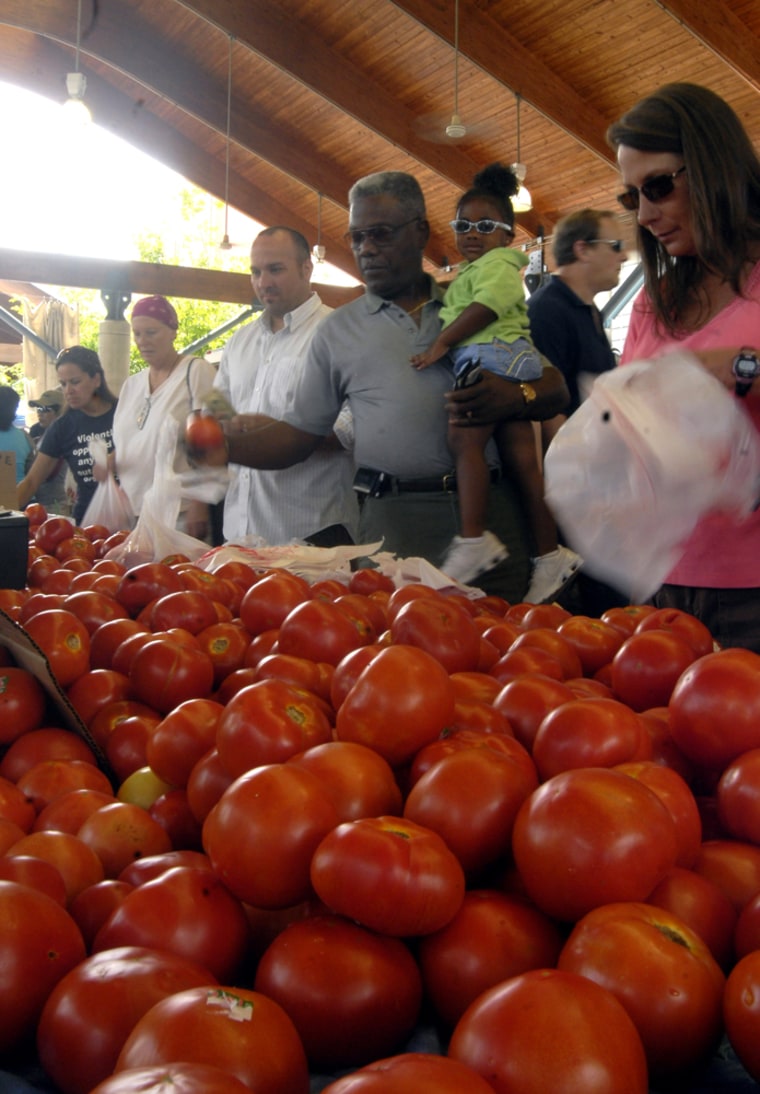Small and local tomato farmers across the country are enjoying boom times as consumers spurn grocery store offerings because of the salmonella scare.
The federal government said Wednesday that 383 people had fallen ill with salmonella, causing sleepless nights for commercial tomato distributors worried that the scare could cause a long-term drop in sales. Large growers, grocers and restaurateurs are already suffering significant economic damage, said Liz Compton, a spokeswoman for the Florida Agriculture Department.
Jaydee Hanson, a policy analyst at the nonprofit Center for Food Safety, called it “a nightmare for growers.”
“The tragedy is that people will quit eating things that are safe because they’re worried,” Hanson said.
But folks aren’t so fast to give up their tomatoes. Instead of swearing off, they’re turning to local growers and farmers markets, where the fruit is selling out as fast as it can be trucked in.
“Last week we sold about a thousand pounds of tomatoes between commercial accounts and farmers markets,” said Wendi Harrison, who helps run a local farm in Charlottesville, Va.
Growing trend to locally grown food The Food and Drug Administration hasn’t pinpointed the source of the salmonella contamination in the nation’s tomato supply, meaning locally grown and distributed fruit hasn’t been officially declared safe.
But Americans were already turning more regularly to farmers markets and so-called “direct-to-consumer” sellers of produce for several years. A study by the Harvard School of Public Health Project on the Public and Biological Security found this month that consumers had the highest confidence in produce sold at local farms and farmers markets, and such sales are up 19 percent since 2004, according to the U.S. Agriculture Department.
That’s why James Jenkins and Marianne Bradley were picking through the tomatoes last week at the Richmond County Farmer’s Market in Augusta, Ga.
“We are afraid to go the store now and buy, so that is why I ended up down here,” Jenkins said as Bradley, his wife, studied a tomato.
“It’s just gorgeous,” she said. “It makes me want to go home and cook.”
Local growers are getting the same reaction across the country.
“We’re always busy selling tomatoes,” said Sherrill Mayse, who grows and sells tomatoes at Mayse Farm Market in Evansville, Ind.
“It seems like this year we’re more busy getting more calls because people are scared to buy them in the store, and they just want to buy fresh, locally home-grown tomatoes,” Mayse said.
Can local growers keep up?
Many local growers say they can’t keep up with the demand, at least not until late July or August, when harvest season begins in much of the country.
“In weeks like this, when you have extra interest — 50 to 100 percent more — [we] double it, but there’s only so many ready to harvest this week, and just because there’s more interest doesn’t mean we’re going to get more tomatoes,” said Jay Johnson, who grows greenhouse tomatoes at Bushel Boy Tomatoes in Owatonna, Minn.
Randy Davis, owner of Davis Produce in Savannah, Ga., said his sales had doubled in the past few weeks because “a lot of people are scared of the stores.”
Anita Kirkpatrick of Savannah said she chose the local tomatoes at Davis Produce because “you know they’re locally grown, and they’re fresh from the field and haven’t been handled by a lot of people.”
With the growing season just weeks away, farmers at the Glen Burnie Farmer’s Market in Glen Burnie, Md., said they were expecting huge sales.
“They’re definitely saying: ‘I’m waiting for yours. I don’t trust what’s coming out of Florida, Mexico, Texas,’” said Robert Knopp of Knopp Farm in Severn, Md. “I think it’s going to be a plus for local farmers.”
Bobi Crispens of Crispens’ Farms in Millersville, Md., encouraged shoppers to question local growers about their produce. She said farmers could close a sale that way — “they’ll be glad to tell you what fertilizers they use or whatever,” she said.
“Normally, we do two plantings,” Crispens said. “This year, we’re moving into three plantings so that we will have an abundance all the way through.”
Do-it-yourselfers get busy
Some consumers are even taking things into their own hands, choosing to grow their own tomatoes so they don’t have to worry. Karen Sapp, owner of Tomato Growers Supply Co., a national distributor in Fort Myers, Fla., said sales of tomato seeds were up 20 percent this year.
Ron Gagliardo, a botanist at the Atlanta Botanic Garden, said backyard growing was a good idea.
“Does it taste better because you grew it?” Gagliardo asked. “Yes ... and we know what is in it.”
If nothing else, said Wendi Harrison, the grower in Virginia, the scare has brought about positive changes in buyers.
“I hate to say that the scare is good, but it does raise people’s awareness of where their food is coming from,” she said.
